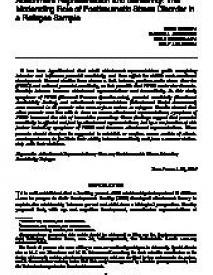Attachment representation and sensitivity : the moderating role of posttraumatic stress disorder in a refugee sample
It has been hypothesized that adult attachment representations guide caregiving behavior and influence parental sensitivity, and thus affect the child's socio-emotional development. Several studies have shown a link between posttraumatic stress disorder (PTSD) and reduced parental sensitivity, so it is possible that PTSD moderates the relationship between insecure attachment representations and insensitivity. In this study symptoms of PTSD (Harvard Trauma Questionnaire), parental sensitivity (Emotional Availability Scales), and attachment representations (Attachment Script Assessment) were assessed in 53 parents who were asylum seekers or refugees. Results showed that when parents were less able to draw on secure attachment representations, symptoms of PTSD increased the risk of insensitive parenting. These findings suggest that parental sensitivity is affected not just by attachment representations, but by a conjunction of risk factors including symptoms of PTSD and insecure attachment representations. These parents should therefore be supported to establish or confirm secure models of attachment experiences, to facilitate their ability interact sensitively and form a secure relationship with their children.
Geachte bezoeker,
De informatie die u nu opvraagt, kan door psychotraumanet niet aan u worden getoond. Dit kan verschillende redenen hebben,
waarvan (bescherming van het) auteursrecht de meeste voorkomende is. Wanneer het mogelijk is om u door te verwijzen naar de bron
van deze informatie, dan ziet u hier onder een link naar die plek.
Als er geen link staat, kunt u contact opnemen met de bibliotheek,
die u verder op weg kan helpen.
Met vriendelijke groet,
Het psychotraumanet-team.
In: Family Process, ISSN 0014-7370 | 56 | 3 | September | 781–792
http://doi.org/10.1111/famp.12228


